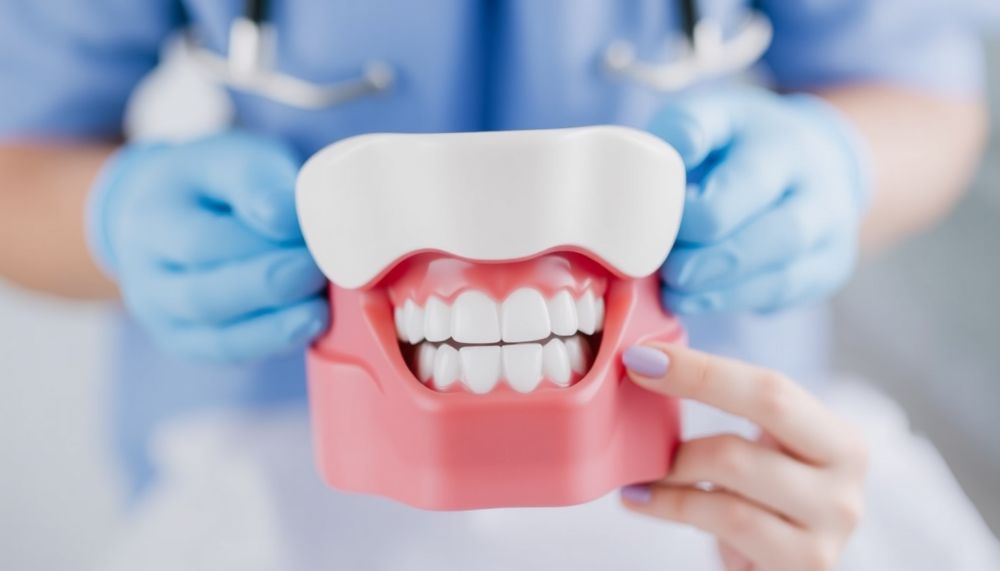
10 Must-Know Factors Before Choosing Your Dental Implant Specialist
Last Updated: December 7, 2024 2:32 am | Medically Reviewed by Dr. Michael Berglass, DDS

Choosing a dental implant specialist is an important step in restoring your smile. This decision can affect your oral health and well-being for years to come, so it’s vital to consider several factors before making your choice.
Picking the right dental implant specialist involves looking at their skills, experience, and the technology they use.
This article will explore ten key factors when selecting a specialist for your dental implants.
Understanding these factors can help you make a more informed decision and feel confident in your choice of dental professional.

Qualifications and certifications are crucial when choosing a dental implant specialist. Look for a dentist with specialized training in implantology. This extra education shows dedication to the field.
Board certification is another important factor. A board-certified implant specialist has passed rigorous exams and meets high standards of care.
Check if the specialist has completed continuing education courses in dental implants. This shows they stay up-to-date with the latest techniques and technologies.
Ask about their experience in performing implant procedures. An experienced specialist is likely to have a successful track record.
Look for memberships in professional organizations like the American Academy of Implant Dentistry. These memberships indicate a commitment to excellence in the field.
Remember, proper qualifications and certifications help ensure you receive high-quality care for your dental implant procedure.
A dental implant specialist’s experience is crucial when choosing the right professional for your needs. Look for a specialist who has performed many implant surgeries and can show a proven track record of success.
Ask about the number of implant procedures they have completed. A skilled specialist should be able to provide this information readily. They may also share their success rates, which can give you confidence in their abilities.
Experienced implant specialists often have a portfolio of before-and-after photos from previous patients. These images can help you see the quality of their work and the results you might expect.
Patient testimonials are another good indicator of a specialist’s experience and skill. Happy patients are often willing to share their positive experiences, which can be reassuring for those considering implant treatment.
Don’t hesitate to ask about the specialist’s training and ongoing education in implant dentistry. The field is always evolving, and a dedicated professional will stay up-to-date with the latest techniques and technologies.
Modern dental implant procedures rely heavily on cutting-edge technology. A top-notch specialist will use state-of-the-art equipment to ensure precise and successful implant placement.
Look for a practice that employs 3D imaging systems. These provide detailed views of a patient’s oral structures, allowing for more accurate implant planning and placement.
Another important feature is computer-guided implant technology. This technology helps specialists place implants with exceptional accuracy, reducing the risk of complications.
Digital impressions are also a sign of a technologically advanced practice. They offer greater comfort for patients and produce highly accurate models for creating custom implant components.
Leading specialists use CAD/CAM technology to design and manufacture custom implant parts, ensuring a perfect fit for each patient’s unique dental structure.
Patients should ask potential specialists about the technology they use in their practice. A willingness to invest in advanced equipment often indicates a commitment to providing the best possible care.
Reading patient reviews can give you valuable insights into a dental implant specialist’s care quality. Look for feedback on reputable sites, Google My Business, or the dentist’s website.
Pay attention to comments about the dentist’s professionalism and communication skills. Patient reviews and testimonials can help you gauge the specialist’s bedside manner and overall patient satisfaction.
Positive experiences from other patients can boost your confidence in a provider. Look for reviews that mention successful outcomes and patient comfort during treatment.
It’s also helpful to consider any negative feedback and how the specialist responded. This can show their commitment to patient care and willingness to address concerns.
Hearing from other patients can give you a clearer picture of what to expect during your own dental implant journey. It can help you make a more informed decision about which specialist to choose for your treatment.
If you’re ready to get started, call us now!
Dental implants have impressive success rates, often exceeding 95% over a decade. This high success rate makes them a reliable option for replacing missing teeth.
Several factors can influence the success of dental implant procedures. A patient’s oral health plays a crucial role in determining the outcome. Good oral hygiene and healthy gums create a better environment for implant integration.
The experience and skill of the dental implant specialist also impact success rates. A skilled professional can navigate complex cases and minimize potential complications.
The type of surgical technique used can affect the procedure’s success. Guided surgery, which uses a template to place the implant, is a common and effective method.
While general statistics are encouraging, individual success rates may vary. Factors such as smoking, certain medical conditions, and bone density can influence outcomes.
Patients should discuss their specific case with their dental implant specialist to understand their personal success rate expectations.
A top dental implant specialist provides clear instructions for post-operative care. These guidelines help patients recover smoothly and ensure the success of their implants.
Patients should expect advice on managing pain and swelling after the procedure. The specialist may recommend ice packs and over-the-counter pain relievers to keep discomfort in check.
Proper oral hygiene is crucial following implant surgery. The specialist will gently explain how to clean the area without disturbing the healing process.
Diet plays a key role in recovery. Soft foods are typically recommended for the first few days. The specialist will provide a timeline for returning to normal eating habits.
Follow-up appointments are an essential part of post-operative care. These visits allow the specialist to monitor healing and address any concerns promptly.
Patients should be informed about potential complications and when to seek immediate care. A reputable specialist should ensure patients know how to reach them if issues arise.
The specialist may also offer guidance on wearing temporary prosthetics during healing. This helps maintain appearance and function while the implants integrate.
When choosing a dental implant specialist, it’s important to consider their availability for consultations. A good specialist should offer flexible scheduling options to fit patients’ needs.
Some dentists provide evening or weekend appointments to accommodate busy work schedules. This can make it easier for patients to attend regular check-ups and follow-up visits.
The specialist should also be willing to set aside enough time for thorough consultations. During these meetings, patients can ask questions and discuss their concerns about the implant procedure.
A readily available dental implant specialist can help ease patients’ anxieties. They should be able to promptly address any issues during the treatment process.
It’s helpful if the specialist offers multiple communication methods, such as phone calls, emails, or even video consultations. This allows patients to reach out with questions or concerns between appointments.
Patients should feel comfortable asking about the specialist’s availability before committing to treatment. A caring professional will understand the importance of being accessible to patients throughout the implant journey.
Dental implant specialists should offer various implant options to suit different patient needs. A good specialist will provide multiple types of implants, including traditional endosteal implants, mini implants, and All-on-4 implants.
Endosteal implants are the most common type and are suitable for most patients. They are placed directly into the jawbone and can support one or more artificial teeth.
Mini implants are smaller in diameter and may be recommended for patients with less bone density. They can often be placed with less invasive procedures.
All-on-4 implants use four implants to support a full arch of teeth. This option can be ideal for patients needing full mouth restoration.
The specialist should also offer various implant materials, such as titanium and zirconia. Titanium is widely used due to its durability and biocompatibility. Zirconia implants are metal-free and may be preferred by some patients.
A qualified implant specialist will assess each patient’s unique situation and recommend the most appropriate option. They should explain the pros and cons of each choice to help patients make informed decisions about their dental health.
If you’re ready to get started, call us now!
Dental implant specialists who work closely with other healthcare professionals can provide better care. This team approach allows for a more complete treatment plan.
Interprofessional collaboration benefits patients by addressing their overall health. Dentists may work with doctors, surgeons, and other specialists to ensure the best outcomes.
A good implant specialist will communicate with the patient’s general dentist. They may also consult with periodontists or oral surgeons when needed. This teamwork helps manage complex cases more effectively.
Some dental practices have built relationships with other healthcare providers to offer comprehensive care. These connections can lead to better treatment planning and follow-up care.
Patients should ask about a specialist’s approach to collaboration. A willingness to work with other professionals often indicates a commitment to quality care.
Team collaboration in dental practices can also improve patient experiences. When all staff members work together smoothly, the patient environment is more comfortable.
Dental implant procedures require strict adherence to infection control protocols, which protect patients from potential infections during and after surgery.
A reputable dental implant specialist follows standard precautions and infection control recommendations set by dental associations. They use sterilized instruments and maintain a clean environment.
The specialist should wear personal protective equipment, such as gloves, masks, and eyewear, to help prevent the spread of harmful bacteria and viruses.
Proper hand hygiene is crucial. The dentist and staff must wash their hands thoroughly before and after treating each patient.
Dental offices should have clear guidelines for cleaning and disinfecting surfaces, including dental chairs, light handles, and countertops.
Patients can ask about the office’s sterilization procedures for tools and equipment. A good specialist will be happy to explain their infection control measures.
Regular staff training on infection control is important. This ensures everyone in the practice follows the latest safety guidelines.
How can one determine the expertise level of a dental implant specialist?
Look for a dentist with extensive training in implant procedures. Check their continuing education and years of experience placing implants. Ask about their success rates and how many implant surgeries they perform annually.
What credentials should a qualified implant dentist have?
A qualified implant dentist should have a degree from an accredited dental school and specialized training in implantology. Look for memberships in professional organizations like the American Academy of Implant Dentistry.
What factors influence the success rate of dental implants?
Several factors affect implant success, including the dentist’s skill, the patient’s oral health, and bone quality. Smoking and certain medical conditions can also impact outcomes. A thorough evaluation before the procedure helps predict success rates.
How do the costs of dental implant procedures vary among providers?
Implant costs can vary based on the dentist’s experience and location. The type of implant and materials used also affect pricing. Some dentists offer package deals or financing options. It’s important to compare costs but not sacrifice quality for a lower price.
Can dental insurance typically cover a significant portion of implant procedure costs?
Many dental insurance plans offer limited coverage for implants. Some may cover a portion of the crown but not the implant itself. It’s crucial to check with the insurance provider about specific coverage details. Some dentists offer in-house payment plans to help manage costs.
What is the difference in experience between an oral surgeon and a periodontist regarding implant placement?
Oral surgeons and periodontists both receive specialized training in implant placement. Oral surgeons focus on complex extractions and jaw surgeries, while periodontists specialize in gum health and bone regeneration. Depending on individual patient needs, both can be excellent choices for implant procedures.